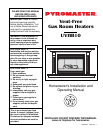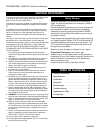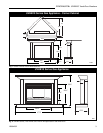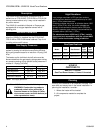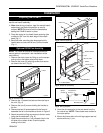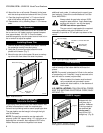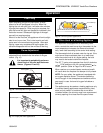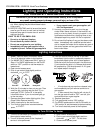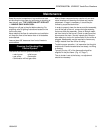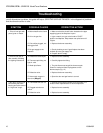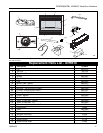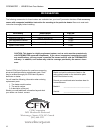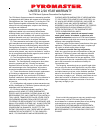
2
PYROMASTER® UVHB10 Vent-Free Heaters
20004232
General Information
This gas room heater should be installed by a qualified installer
in accordance with local building codes and with current
National Fuel Gas Code. ANSI Z223.1.
This heater should not be installed in a confined space unless
provisions are made for adequate combustion and ventilation
air.
The National Fuel Gas Code defines a confined space as "a
space whose volume is less than 50 cubic feet per 1000 BTU
per hour (4.83 per kw) of the aggregate input rating of all
appliances installed in that space" and unconfined space as
"space."
If the area in which the heater may be operated is smaller than
that defined as an "unconfined space," provide adequate
combustion and ventilation air by one of the methods described
in the National Fuel Code, ANSI Z223.1, 1992, Section 5.3.
FOR SAFE INSTALLATION AND OPERATION OF YOUR
PYROMASTER VENT-FREE ROOM HEATER PLEASE NOTE
THE FOLLOWING:
1. This heater gives off high temperatures and should be
located out of high traffic areas and away from furniture and
draperies.
2. This appliance is for supplemental heating only. It should
not be used as the primary heat source for a dwelling.
3. Children and adults should be alerted to the hazards of the
high surface temperatures of this heater and should stay
away to avoid burns or ignition of clothing.
4. Children should be carefully supervised when they are in
the same room as your heater.
5. Under no circumstances should this heater be modified.
Parts removed for service should be replaced prior to
operating this heater again.
6. Installation and any repairs to this heater should be carried
out by a qualified service person. A professional service
person should be contacted to inspect this heater annually.
Make it a practice to have all of your gas heaters checked
annually. More frequent cleaning may be required due to
excess lint and dust from carpeting, bedding material, etc.
7. Control compartments, burners and air passages in this
heater should be kept clean and free of dust and lint. Make
sure that the gas valve and pilot light are turned off before
you attempt to clean this unit.
8. WARNING: Failure to keep the primary air opening(s) of the
burner(s) clean may result in sooting and property damage.
9. Under no circumstances should any solid fuels (wood, coal,
paper or cardboard, etc.) be used in this heater.
10.Keep the area around your heater clear of combustible
materials, gasoline and other flammable vapor and liquids.
This heater should not be used as a drying rack for clothing,
nor should Christmas stockings or decorations be hung in
the area of it.
11. Under no circumstance should this Heater be installed in a
chase or used with any other mantel than the approved
FPS1212NC, FPS1214 or FPS1213N mantels.
12. Do not install heater in bedroom or bathroom.
13. Avoid propane tank dropping below 25% full. This will help
prevent soot from occurring.
Safety Devices
Adequate combustion and ventilation air must be pro-
vided. The flow of combustion and ventilation air MUST
NOT be obstructed.
Provide adequate clearances around the air opening into
the combustion chamber; and adequate accessibility
clearance for servicing and proper operation. NEVER
obstruct the front opening of the heater or cover the top
and bottom louvres.
These heaters are equipped with a pilot system featuring
an Oxygen Depletion Sensor (O.D.S.) shut-off device. All
unvented heaters are required to have this system. The
O.D.S. pilot will shut down the heater when there is not
enough fresh air available.
Report any parts damaged in shipment to your dealer.
Proposition 65 Warning: Fuels used in gas,
woodburning or oil fired appliances, and the products of
combustion of such fuels, contain chemicals known to the
State of California to cause cancer, birth defects and
other reproductive harm.
California Health & Safety Code Sec. 25249.6
Table Of Contents
General Information . . . . . . . . . . . . . . . . . 2
Specifications . . . . . . . . . . . . . . . . . . . . . . 3
Installation . . . . . . . . . . . . . . . . . . . . . . . . . 5
Operation . . . . . . . . . . . . . . . . . . . . . . . . . 7
Maintenance . . . . . . . . . . . . . . . . . . . . . . . 9
Troubleshooting . . . . . . . . . . . . . . . . . . . 10
Replacement Parts . . . . . . . . . . . . . . . . . 11
Accessories . . . . . . . . . . . . . . . . . . . . . . . 12



